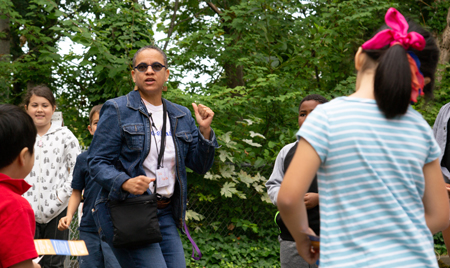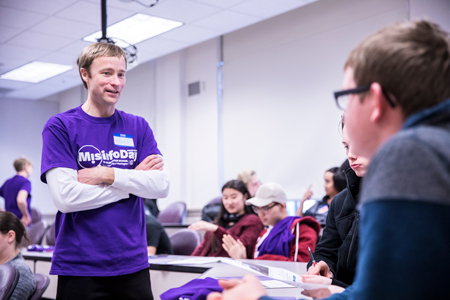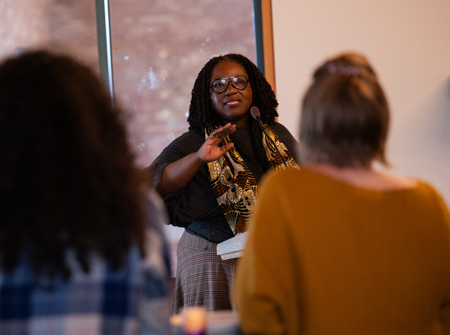Timeline: 25 years of the Information School
The Information School celebrates its 25th anniversary as an independent school in the 2025-26 academic year. Here's a look at some key events:
- 1996: The UW studies the future of the Graduate School of Library and Information Sciences. A committee issues a bold plan calling for the re-creation of the school as a vital piece of the Information Age.
- 1998: Michael Eisenberg is hired as director with a vision for transforming the library school into a robust Information School.
- 2000: Ph.D. in Information Science first offered. The school welcomes its first seven Ph.D. students in autumn quarter, 2000.
- 2000: Informatics major created. Beginning in autumn quarter, the iSchool begins offering a new Informatics major that emphasizes the human side of technology. 27 students join for the first cohort.
- 2001: The school moves into Mary Gates Hall. The university’s newest building offers state-of-the-art technology. It remains the school’s home base for at least the next quarter-century.

2001: The Information School celebrates its launch at a gala event. 2001: The Information School becomes an independent school at the UW. The school celebrates with a gala event on Jan. 6, officially becoming the 16th independently organized school after the 2000-01 academic year. “Our transformation is complete!” says Eisenberg, now dean of this new school, which he immediately brands the “iSchool.”
- 2001: Master of Science in Information Management added. The program offers industry-relevant skills that help students become strategic leaders in a wide range of fields.
- 2005: The Beverly Cleary Endowed Professorship is formed. The professorship, named for and supported by the beloved children’s author, supports teaching and scholarship in children and youth services.
- 2006: Harry Bruce becomes the second dean of the iSchool. Eisenberg stays on as a professor through 2014, focusing on teaching.
- 2007: The Center for Information & Society (CIS) joins the school, becoming its first research center. Established in 1999 in the Office of the Vice Provost for Global Affairs, the CIS is known for research on information and communication technologies and development.
- 2008: Eliza Dresang is named the first Beverly Cleary Endowed Professor for Children and Youth Services. Dresang, a well-known champion of children’s literature and digital resources, holds the professorship until her death in 2014.
- 2009: The CIS becomes the Technology & Social Change Group, or TASCHA for short. Its research portfolio includes libraries and access to information around the world, with partners in more than 50 countries.
- 2011: The school survives financial turmoil. Facing significant state budget cuts, the UW considers consolidating the Information School with another unit on campus. In April, the provost affirms that the school will remain independent.
- 2013: Women in Informatics (Winfo) holds its first hackathon. Formed in 2012, the student group seeks to empower women to thrive in technology fields. Winfo also promotes Informatics among women, who comprise 30% of the major and a smaller percentage of other STEM majors at the UW.

2016: Michelle H. Martin joins the school as the Beverly Cleary Professor for Children and Youth Services. 2016: Michelle H. Martin is named the second Beverly Cleary Endowed Professor for Children and Youth Services. Martin, who joins the school from the University of South Carolina, is a renowned author, essayist, lecturer, book critic, community literacy activist, and champion of diversity in children’s literature.
- 2016: Susan Hildreth is named the first Distinguished Practitioner in Residence. Funded by a 10-year, $1.4 million grant from the Bill & Melinda Gates Foundation, the program brings fresh perspectives from the library world to the academic one. Rolf Hapel, Cindy Aden, Lorcan Dempsey and Tracie D. Hall would later follow Hildreth.
- 2017: “Calling Bullshit in the Age of Big Data,” a course developed by the iSchool’s Jevin West and biology professor Carl Bergstrom, is first offered. The provocatively titled course focusing on information literacy fills its 160 seats within one minute.
- 2017: Informatics minor added. Faced with rising demand for the Informatics program, the iSchool launches a non-competitive Informatics minor that quickly becomes one of the most popular at the UW.
- 2018: Anind K. Dey becomes the third dean of the iSchool after Harry Bruce’s retirement. Dey had previously been a professor and director of the Human-Computer Interaction Institute at Carnegie Mellon University.

2019: Jevin West speaks with teens at the first MisinfoDay. 2019: The first MisinfoDay brings about 200 high school students to campus. The information literacy event, which began as MLIS student Liz Crouse’s Capstone project, continues to grow and spread to multiple locations across the state in subsequent years.
- 2019: The Center for an Informed Public launches with a mission of resisting strategic misinformation, promoting an informed society, and strengthening democratic discourse.
- 2020: The first AI-focused class is offered: The doctorate-level research seminar course supported then Ph.D. candidate Stefania Druga’s work to create a novel AI literacy framework for families.
- 2020: Amid the COVID-19 pandemic, the school is among the first to go fully remote. After years of offering online courses and hybrid work, the school handles the transition with few disruptions.
- 2020: The Joseph and Jill McKinstry Endowed Faculty Fellowship in Native North American Indigenous Knowledge is established. Miranda Belarde-Lewis is named the inaugural recipient.
- 2021: Master of Science in Information Management adds online mode: The school expands access to its MSIM program with fully online options for all three program tracks: Early-Career, Early-Career Accelerated and Mid-Career.

2024: Tracie D. Hall speaks during a launch event for CALMA. 2022: Women comprise 50% of Informatics majors. Ten years after the formation of Winfo, the major achieves gender parity for the first time.
- 2023: Informatics surpasses 1,000 active majors, making it one of the most popular at the UW.
- 2023: UW’s Museology program joins the iSchool after 51 years operating separately in the UW Graduate School.
- 2024: The Center for Advances in Libraries, Museums, and Archives celebrates its launch. CALMA seeks to create a community around research related to those institutions and amplify the work.
- 2025: The Information School reaches #1 in U.S. News & World Report’s rankings of master’s programs in library and information studies.